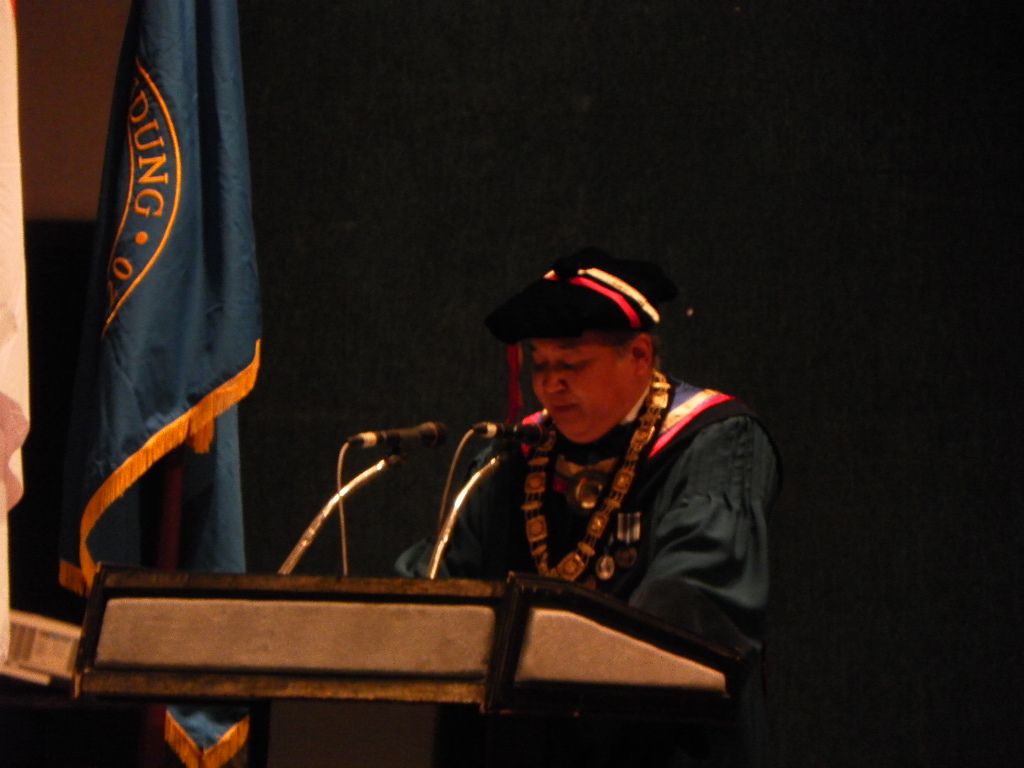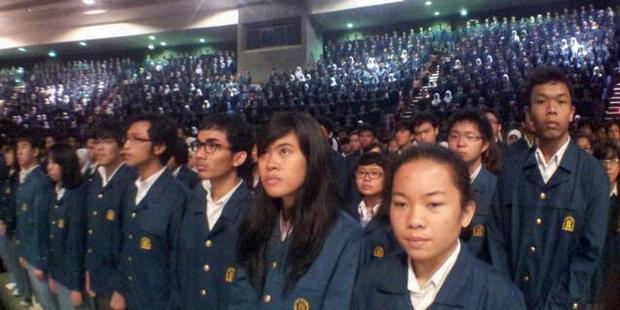Rector of ITB: The Importance of Developing Moral Character in science and technology personnel
By Hafshah Najma Ashrawi
Editor Hafshah Najma Ashrawi

 BANDUNG, itb.ac.id - As in previous years, the Open Session ITB Admissions Academic Year 2013/2014 is always preceded by a speech from Rector. Monday (8/19/13) at Sasana Budaya Ganesha (Sabuga), the speech is titled "science and technology personnel are useful for Nation Building". In the speech, the Rector of ITB, Prof.. Akhmaloka, PhD speaks about the importance of students in developing intellectual capacity, and do not forget to also build an adequate moral character.
BANDUNG, itb.ac.id - As in previous years, the Open Session ITB Admissions Academic Year 2013/2014 is always preceded by a speech from Rector. Monday (8/19/13) at Sasana Budaya Ganesha (Sabuga), the speech is titled "science and technology personnel are useful for Nation Building". In the speech, the Rector of ITB, Prof.. Akhmaloka, PhD speaks about the importance of students in developing intellectual capacity, and do not forget to also build an adequate moral character.
At first, the speech the president talked about the importance of maintaining and upholding the values and norms of academic or academic excellence. Hallmark of academic excellence is the norm: 1) love of truth and science and technology as well as uphold the scientific principles in the development of science and technology, 2) the spirit and commitment to advancing science and technology; 3) mutual respect for the different perspectives, and 4) be open to dialogue within the framework of efforts to promote science and technology. Although divided into various fields of science, ITB students should use the knowledge of diversity to interact, communicate, and collaborate for the advancement of science and technology.
Meanwhile, ITB campus as a place of intellectual potential development capacity also has other functions. In addition to the intellectual capacity, students also need to develop good moral character. "Without sufficient moral character, intellectual capacity will be like 'weapon in the hands of the blind," said Akhmaloka. In the speech, Akhmaloka describes two important elements of the moral character, the social responsibility and social accountability.
A man said to be science and technology have a great social responsibility as to his knowledge he is able to create a reasonable solution to the problems in the vicinity. Responsibility is based on a sense of social awareness. The next element is the social accountability. A human being should be able to see science and technology and take into account the social consequences of the actions that he did. He is responsible for ensuring that the decisions that he has made no negative social consequences. This element is also based on a sense of social awareness.
 Social care is expected to be trained and honed in college and campus life. Both of the above elements can be studied both in the classroom, studio space, school grounds, and also student activities. Opponents of the social concern is social indifference. The indifference of nature that is the source of the apathetic nature towards indifference rights of others and cultivate the seeds of growth of corrupt character. If the social indifference is embedded in the character of a person, then he will be vulnerable to the temptation to engage in corruption.
Social care is expected to be trained and honed in college and campus life. Both of the above elements can be studied both in the classroom, studio space, school grounds, and also student activities. Opponents of the social concern is social indifference. The indifference of nature that is the source of the apathetic nature towards indifference rights of others and cultivate the seeds of growth of corrupt character. If the social indifference is embedded in the character of a person, then he will be vulnerable to the temptation to engage in corruption.
Science and technology does not explicitly instruct a particular social mission. But the breath of science is the principle of upholding the truth. The inside, embodied the spirit-the spirit of defending the rights of others and defending the right. "A true human science and technology will always stay away from corrupt practices because he was always hold his noble principles of truth and human dignity," said Akhmaloka.
At the end of his speech, Akhmaloka advised on thousands of new students that they are the sons and daughters of the people who have earned the opportunity. There are a mandate to always give their best. Then the spirit of giving the best should be used as a character for the academic journey at ITB.
Meanwhile, ITB campus as a place of intellectual potential development capacity also has other functions. In addition to the intellectual capacity, students also need to develop good moral character. "Without sufficient moral character, intellectual capacity will be like 'weapon in the hands of the blind," said Akhmaloka. In the speech, Akhmaloka describes two important elements of the moral character, the social responsibility and social accountability.
A man said to be science and technology have a great social responsibility as to his knowledge he is able to create a reasonable solution to the problems in the vicinity. Responsibility is based on a sense of social awareness. The next element is the social accountability. A human being should be able to see science and technology and take into account the social consequences of the actions that he did. He is responsible for ensuring that the decisions that he has made no negative social consequences. This element is also based on a sense of social awareness.
 Social care is expected to be trained and honed in college and campus life. Both of the above elements can be studied both in the classroom, studio space, school grounds, and also student activities. Opponents of the social concern is social indifference. The indifference of nature that is the source of the apathetic nature towards indifference rights of others and cultivate the seeds of growth of corrupt character. If the social indifference is embedded in the character of a person, then he will be vulnerable to the temptation to engage in corruption.
Social care is expected to be trained and honed in college and campus life. Both of the above elements can be studied both in the classroom, studio space, school grounds, and also student activities. Opponents of the social concern is social indifference. The indifference of nature that is the source of the apathetic nature towards indifference rights of others and cultivate the seeds of growth of corrupt character. If the social indifference is embedded in the character of a person, then he will be vulnerable to the temptation to engage in corruption.Science and technology does not explicitly instruct a particular social mission. But the breath of science is the principle of upholding the truth. The inside, embodied the spirit-the spirit of defending the rights of others and defending the right. "A true human science and technology will always stay away from corrupt practices because he was always hold his noble principles of truth and human dignity," said Akhmaloka.
At the end of his speech, Akhmaloka advised on thousands of new students that they are the sons and daughters of the people who have earned the opportunity. There are a mandate to always give their best. Then the spirit of giving the best should be used as a character for the academic journey at ITB.

.jpg)
.png)
.jpg)
.jpg)
.jpg)

